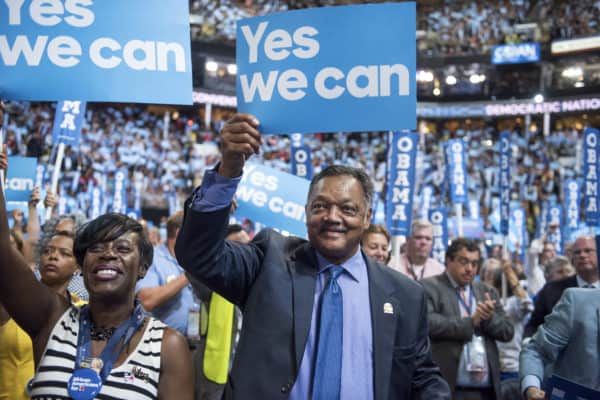Kamala Harris and Jesse Jackson Endorse Rival White Candidates
Chris Roberts, American Renaissance, March 9, 2020
Kamala Harris has just endorsed Joe Biden for the nomination. This is a curious decision for the California senator who reached second place in a number of polls last summer. It was her attacks on Joe Biden’s past opposition to busing and close ties with segregationist Senators that boosted her campaign.
Why is she endorsing him after that? Now that Mr. Biden seems likely to win the nomination, she probably expects something in return. Many people think that since Mr. Biden is old, white, and male, he will need a young, female, non-white running mate. By endorsing Mr. Biden before his coronation, Mrs. Harris is probably presenting her resume.
Jesse Jackson, meanwhile, has endorsed Vermont Senator Bernie Sanders, and the endorsement could made a difference. The Michigan primary is on Tuesday, and 125 delegates are at stake. If Mr. Biden wins, his victory will seem assured. If Mr. Sanders wins, voters will think he still has a chance. In 2016, the Democratic Socialist won the state by a slim margin, much to the surprise of pundits and pollsters, who were predicting a win for Hillary. However, this year, Mr. Sanders has lost a lot of the support from the rural, poor, and working-class whites who gave him that victory.
With an endorsement from Reverend Jackson, the Sanders campaign can hope that more support from blacks — a group that almost never votes for Mr. Sanders — can make up for lagging white support. Rev. Jackson is one of the nation’s most recognized black advocates, and during his own bid for the Democrat nomination in 1988, he won Michigan with 15 percent more of the vote than his nearest rival. That year, Mr. Sanders endorsed him.

July 27, 2016, Philadelphia, PA — Rev. Jesse Jackson cheers for President Barack Obama at the Wells Fargo Center in on the third day of the Democratic National Convention. (Credit Image: © Tom Williams / Congressional Quarterly / Newscom via ZUMA Press)
Mr. Jackson had run four years earlier, in 1984, but placed a distant third in Michigan, behind Walter Mondale and Gary Hart. He was hurt by a scandal from earlier that year:
[H]e was quoted (by a black reporter) as having privately referred to Jews as “Hymies” and New York as “Hymietown.” For two weeks, he denied even having made the remarks; finally he admitted it, offered a limp apology but complained that he was “being taken advantage of.”
It is curious that four years later, Bernie Sanders, a Jew from New York City, endorsed him, and now seems pleased to get his endorsement.
Elizabeth Warren had a hard time getting black votes, too. Shortly before she dropped out, the New York Times published a story called, “Elizabeth Warren Has Won Black Activists. She’s Losing the Black Vote.” A similar piece could be written about Mr. Sanders. Well before Rev. Jackson spoke up, plenty of prominent blacks endorsed the white senator from one of America’s whitest states: Keith Ellison, Ilhan Omar, Cornel West, Shaun King, Danny Glover, Boots Riley, etc., but this didn’t bring out many black votes. Rev. Jackson is certainly a major national figure, but it’s important to remember that Michigan is much more than just the black city of Detroit. The state is still 75 percent white and only 14 percent black. So far in 2020, the blackest state Mr. Sanders has won is Nevada, which is 10 percent black. Mr. Biden won the black vote there, but Mr. Sanders took the state with the help of the state’s enormous number of Hispanics.
No brown wave can save Mr. Sanders in the Upper Midwest, and every black vote he wins because of Mr. Jackson’s endorsement may cost him a white vote. A good thing, too. Any candidate who has picked up endorsements from the gaggle of black radicals and Muslims who have backed Mr. Sanders is no friend of ours.















